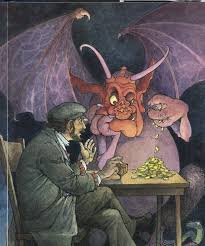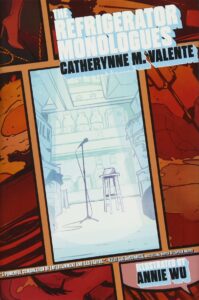For a year that started out with a struggle to read much of anything at all, 2021 brought numerous books that made me very happy to read, to have read, to browse repeatedly, and to go back and read bits of them again and again. Both Hershel and the Hanukkah Goblins and Fletcher and Zenobia are children’s picture books, and they delight me every time. Dungeons & Dragons Art & Arcana: A Visual History is a picture book of a different sort; the time I spend with it on re-reading is a mix of remembering and imagining, and it is a wonderful book for both.
I read two large books about rock bands from the 1960s, and I loved them both. Outside the Gates of Eden was written by Lewis Shiner, who was there for the ’60s; Utopia Avenue was written by David Mitchell, who was born in 1969 and thus has a different perspective. Shiner is a Texan, Mitchell is an Englishman, both have their characters start bands locally but then pass through New York and San Francisco where they encounter well-known personalities of the era. Mitchell ends the main story still in the ’60s, with the bridge to the 21st century sketched out in a touching epilogue. Shiner follows his characters all the way through to a slightly alternate version of the 2010s. Both books are brilliant and worth the long ride.
Other books that were long on delight and make me smile again just thinking about them: The Witness for the Dead by Katherine Addison, a second book set in the world of The Goblin Emperor; All Systems Red by Martha Wells, since I finally got around to the first Murderbot novella; All-American Muslim Girl by Nadine Jolie Courtney, exactly what it says; and A Wizard’s Guide to Defensive Baking by T. Kingfisher, which is not so much a guide but would probably be helpful all the same under certain circumstances.
In 2021, I read nine books in translation: four from Japanese (manga not reviewed here), plus one each from Polish, Icelandic, Turkish, Spanish and Italian. I read five books in German, all from the series “München erlesen” (“Munich selections” with a pun on the German verb for reading). One of them was terrible, another was meh at best, and none of the other three was really great, so on the whole it was a so-so year for reading in German. I did better with poetry: seven book-length collections, which is definitely the most in many years. Four from Seamus Heaney, all terrific. I think of North and Station Island with particular pleasure. I did not connect nearly as well with Louise Glück. Part of the reason could be that I started with her first published collection about which she wrote, “Toward the poems of Firstborn, some written nearly 35 [now more than 50] years ago, I try to cultivate an attitude of embarrassed tenderness.”
Thirty-five of the books I read this year were written or co-written by men. Twenty-six of the books I read this year were written or co-written by women. I read three books (plus the excerpt from Cemetery Boys that was in the Hugo voter’s packet but which did not move me to get the rest of the book) by people who are publicly non-binary and/or trans. Wikipedia says that the gender of the author of The Promised Neverland is not known to the general public. A lot more of the books, especially the Hugo finalists, had characters who were non-binary or trans, but I did not keep specific count.
Eight of this year’s books were re-reads, including three of the first four books I read in 2021. It was that kind of a January. I’ll probably re-read all of them again, except for Splinter of the Mind’s Eye, which was nevertheless worth re-visiting. Now that I have a proper copy, I keep Fletcher and Zenobia close at hand for those moments when it’s the very thing.
Best deconstruction of tropes: The Refrigerator Monologues by Catherynne M. Valente. Best trilogy by a Fellow of Merton College, Oxford: Do I even have to name this one? Best romp not yet mentioned: The Left-Handed Booksellers of London by Garth Nix. Scariest book: The Man Without a Face by Masha Gessen. Best book of big ideas and best bits about Ethiopia: Gnomon (twice) by Nick Harkaway. Best example of entirely too much: The Savage Detectives by Roberto Bolaño. Best encounter with the numinous: Piranesi (redux) by Susanna Clarke. Best encounter with theology, possibly best mid-book twist, and best year-ending review: Lent by Jo Walton.
Full list, roughly in order read, is under the fold with links to my reviews and other writing about the authors here at Frumious.
The Fellowship of the Ring by J.R.R. Tolkien
The Promised Neverland #9 by Kaiu Shurai
Hershel and the Hanukkah Goblins by Eric Kimmel
The Two Towers by J.R.R. Tolkien
The Promised Neverland #10 by Kaiu Shurai
Drive Your Plow Over the Bones of the Dead by Olga Tokarczuk
The Man Without a Face by Masha Gessen
The Promised Neverland #11 by Kaiu Shurai
The Return of the King by J.R.R. Tolkien
The Promised Neverland #12 by Kaiu Shurai
Der ewige Spießer by Ödön von Horváth
Wintering Out by Seamus Heaney
Utopia Avenue by David Mitchell
Die Olympiasiegerin by Herbert Achternbusch
Dungeons & Dragons Art & Arcana: A Visual History by Michael Witwer et al.
Shadows of the Short Days by Alexander Dan Vilhjálmsson
Georgia: In the Mountains of Poetry by Peter Nesmyth
The Refrigerator Monologues by Catherynne M. Valente
The Left-Handed Booksellers of London by Garth Nix
Barracoon by Zora Neale Hurston
Genghis Khan by Leo de Hartog
Firstborn by Louise Glück
Münchnerinnen by Ludwig Thoma
Outside the Gates of Eden by Lewis Shiner
A Promised Land by Barack Obama
A Dead Djinn in Cairo by P. Djélì Clark
North by Seamus Heaney
Die Jugendstreiche des Knaben Karl by Karl Valentin
The Relentless Moon by Mary Robinette Kowal
A Deadly Education by Naomi Novik
Ivan the Terrible by Robert Payne and Nikita Romanoff
The House on Marshland by Louise Glück
The Unspoken Name by A.K. Larkwood
The Witness for the Dead by Katherine Addison
Red Notice by Bill Browder
Eastern Standard Tribe by Cory Doctorow
The City We Became by N.K. Jemisin
Fugitive Telemtry by Martha Wells
Gnomon by Nick Harkaway, Part 2
Field Work by by Seamus Heaney
The Red Haired-Woman by Orhan Pamuk
No Time to Spare by Ursula K. Le Guin
A Memory Called Empire by Arkady Martine
All Systems Red by Martha Wells
Descending Figure by Louise Glück
Fletcher and Zenobia by Victoria Chess and Edward Gorey
Piranesi by Susanna Clarke, plus Piranesi Redux
The Savage Detectives by Roberto Bolaño
Black Sun by Rebecca Roanhorse
To the Lake by Kapka Kassabova
Das Erwachen by Josef Ruederer
The Lost Pianos of Siberia by Sophy Roberts
All-American Muslim Girl by Nadine Julie Courtney
A Wizard’s Guide to Defensive Baking by T. Kingfisher
Invisible Cities by Italo Calvino
Elatsoe by Darcie Little Badger
Cemetery Boys by Aiden Thomas
Ring Shout by P. Djèlí Clark
Upright Women Wanted by Sarah Gailey
Finna by Nino Cipri
The Empress of Salt and Fortune by Nghi Vo
Come Tumbling Down by Seanan McGuire
Riot Baby by Tochi Onyebuchi
Station Island by Seamus Heaney
Beneath the Sugar Sky by Seanan McGuire
Splinter of the Mind’s Eye by Alan Dean Foster
Agency by William Gibson
Lent by Jo Walton
Harrow the Ninth by Tamsyn Muir; Premature Evaluation
Bonus bits
From Page to Screen: Dune
The Making of the Atomic Bomb by Richard Rhodes, Pt. 1, Pt. 2
Christmas readings: One, two



1 ping
[…] language. Last year that bumped up to eight, though 2022 was more typical with five, and though 2021 was a weird year for reading I also read five books in German that year. This past spring, though, I noticed that my […]